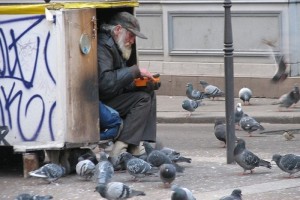“There was a rich man who was clothed in purple and fine linen and who feasted sumptuously every day. And at his gate was laid a poor man named Lazarus, covered with sores . . .” Luke 16:19-20
Listen–can you hear it? A faint, wistful song from thirty-odd years before:
He has brought down the mighty from their thrones
and exalted those of humble estate;
he has filled the hungry with good things,
and the rich he has sent away empty . . . .
Those times his mother sang about (Luke 1:53) are here; hot, sweaty times that jostle the golden thoughts and make that pure tune difficult to hear. But still, it’s happening: he fills the hungry with good things, while the rich go unsatisfied. Everywhere he stops, the sick and the poor, the tax collectors and sinners crowd in close, while the wealthy and healthy maintain a certain distance. They want to hear what he has to say, but his words don’t go down easy. His words, in fact, are like a severe case of indigestion.
“There was a rich man . . .”
What would he know about the life of the “rich”? It’s not all soft robes and feasts every day–it takes work and care to keep up an estate. This rich man probably rose early to consult with his foreman and inspect his lands, and stayed up late going over accounts to make sure they added up correctly and all debts were paid.

“But a poor man named Lazarus, covered with sores, begged at his gate. He longed to be filled with the crumbs that fell from the rich man’s table.”
(Of course; poor men are everywhere. And this is starting to feel like a setup.)
“The poor man died and was carried by the angels to Abraham’s side . . .”
(Oh—there goes poor Lazarus off to heaven! Welcomed by Abraham, no less! What did he do, except be hungry? Where’s the virtue in that?)
“The rich man also died and was buried, and in Hades, being in torment–”
(I knew it. The rich man—the responsible, hardworking, thrifty one–turns out to be the villain.)
“. . . . I beg you, father Abraham, send Lazarus to my father’s house, for I have five brothers, so that he might warn them, lest they also come into this place of torment.”
(Now, this is too much. Abraham says nothing about righteousness and law-keeping, only about full and empty. And the rich man wants Lazarus to go warn his brothers—warn him of what, I’d like to know? What are they supposed to do to avoid the place of torment—just be hungry?)
“. . . But Abraham said to him, if they do not hear Moses and the Prophets, neither will they be convinced if someone should rise from the dead.”
(Someone should rise from the dead—like Lazarus? Is the most flea-bitten beggar on the street suddenly on a level with Moses and the Prophets?
He has satisfied the hungry with good things, and sent the rich away empty . . .
Open your mouth, and I will fill it—But my people did not listen to my voice . . .
Blessed are those who hunger and thirst after righteousness . . .
Looking they may not see, and hearing they may not understand . . .
Neither will they be convinced if someone should rise from the dead . . .
(Who won’t be convinced? Me? Show me a sign like that and I’ll believe. Just don’t try to tell me about rich and poor and who’s in and who’s out.)
That’s exactly what he’s telling them, though. The music is all around, echoes from the past and present and even future, but few have ears to hear. It is about rich and poor, or rather those who think they are rich, and those who know they are poor. It’s about the hungry, and the kind of food they crave. Whatever you’re station in life, he says, be hungry. Whether scrounging for crumbs or sitting down to surf ‘n turf, be hungry. Don’t be satisfied with your accomplishments in life–be hungry.
Hungry for what? For me.
_______________________________________
For the first post in this series, go here.
Next>
